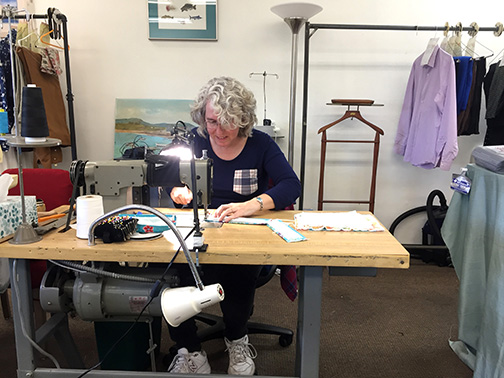
BY EMILY MIBACH
Daily Post Staff Writer
March is usually Efrat Berman’s busy season for her San Carlos-based tailoring business. Right about now, she ought to be neck-deep in prom dresses, but with all of the area’s proms canceled for the foreseeable future due to the COVID-19 outbreak, she’s making face masks.
“If you had asked me a year ago if I expected to be making masks, I wouldn’t even be able to imagine it,” Berman said while picking out some fabric for her next masks. The masks Berman is making are fabric masks that can be reused and washed. The masks have three layers — patterned cotton fabric, nonwoven fabric in the middle and a liner facing your face. Nonwoven fabric is made up of fibers that are fused together, instead of woven, like most materials. Such fabric is used to make surgical masks, and since it is between two layers of cotton, means it can be tossed in the wash and reused.
“They may not be N95’s, but they work,” Berman said while putting her teal and pink flowers mask on.
A community service
Berman, who has run her tailoring shop in San Carlos for eight years, lives in Redwood City and said that while selling masks for $12 a pop won’t make up for her lost revenue due to a lack of prom season, she’s happy to help out her community this way.
Berman is not the only person, or company, who has pivoted their business in order to make medical supplies.
Gap, which also owns Old Navy and Banana Republic, announced on Tuesday that it will be working with hospitals in order to produce needed items such as scrubs and masks. Jacket maker Canada Goose, clothing line Zara, Nike and Hanes have also announced similar measures over the past week as medical supplies have dwindled as COVID-19 cases rise.
Berman said that the veterinarians who work next door to her shop bought masks from her, as have a few nurses. One nurse in particular will be dropping by on Sunday to pick up an order of masks for her coworkers. Berman has also sold masks to people who have passed by her 200 Industrial Road shop and spotted the “Masks Available” sign on her door.
Are the masks sanitary?
The main concern that Berman’s customers have is whether the masks are sanitary. So she has set up a system where she sprays down the fabrics with a sanitizer, makes sure that her hands are clean every step of the process and irons the masks once they are completed, to get rid of any germs that may be left on them. She then slips them into a sanitized baggie, and they are either sent to her customer or sit in her shop until someone buys it.
Going forward, Berman says she is working on a second version of her masks, made up of the same cotton fabric, but with a pocket so a cut-up vacuum filter can be placed inside the mask.
Elastic needed
The main obstacle in making masks for Berman is not fatigue or lack of fabric, it’s lack of elastic. She is nearly out of flat quarter-inch elastic so people can slip the masks on over their ears, giving it a snug fit. Berman said that her supplier of bulk items such as elastic is out, as are all of the retailers she has asked.




God bless her! What ingenuity!
Where is this woman’s business in San Carlos? Name of it or address?